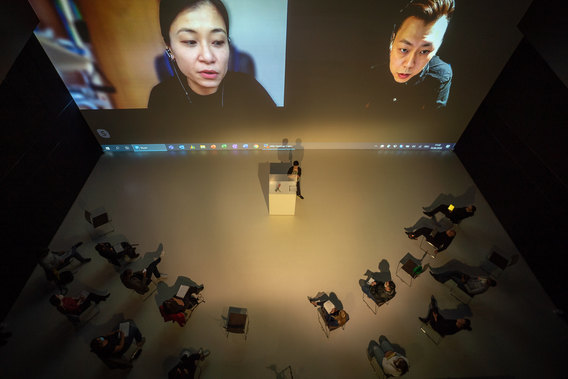
R
E
V N
E
X
T
On June 15, Prix Ars Electronica announced the winners of its 33th edition, conferring for the first time, a Golden Nica to a social movement. Also for the first time, the Golden Nicas of other categories are all awarded to female artists. Recipients of each category will receive up to EUR 10,000 (USD 11,240) towards a future project and an exhibition at the festival, slated to open on September 9.
The category of Digital Communities was awarded to protestors from Hong Kong’s ongoing pro-democracy movement, submitted by Tokyo-based new media artist Eric Siu and Joel Kwong, director of the Microwave International New Media Arts Festival. The movement began in 2019 against government proposals for a now withdrawn extradition bill. The entry is titled “Be Water,” after the protestors’ slogan, itself adopted from the late martial arts star Bruce Lee’s philosophy of adaptivity. The Golden Nica was awarded to the protestors for their digital activism including creative usage of technology and social media to support their cause. According to Stand News, Siu and Kwong will use the cash prize to curate the upcoming Ars Electronica exhibition as well as future touring exhibitions, details of which are yet to be released.
Other campaigns advocating for social change were recognized with Awards of Distinction for this category, namely Lebanon’s Habaq Movement and the Algorithmic Justice League (AJL). The former, aimed at reclaiming local agriculture and food sovereignty, was initiated by the country’s youth due to the ongoing economic crisis. The movement has garnered attention in Lebanon for agriculture technology since Ramy Boujawdeh launched innovation hub Agrytech Program in 2017. Meanwhile, AJL, founded by Ghanian-American computer scientist Joy Buolamwini attempts to educate the public on the potential risks of artificial intelligence through multimedia art and academic research. Apart from Buolamwini’s TED talks, the organization has launched a campaign, #Codedbias, which includes a film premiered at Sundance Film Festival.
American-Japanese animator and director Miwa Matreyek won in the category of Computer Animation with Infinitely Yours (2020), a post-anthropogenic project comprised of animation and live performance focused on environmental concerns. Matreyek often features elements of Japanese architecture and culture, as well as Russian constructivism in her works. She co-founded theater group Cloud Eye Control with artist Chi-wang Yang and composer Anna Oxygen. The group’s show Half Life (2015) premiered at Los Angeles’s REDCAT, exploring the traumatic aftermath of Japan’s 2011 Fukushima nuclear disaster.
Another Los Angeles-based artist Lauren Lee McCarthy won with her interactive installation SOMEONE (2020) in the category of Interactive Art +. The work engages each viewer to play the role of the artificial intelligence Amazon Alexa in the gallery. Meanwhile, Visionary Pioneer of Feminist Media Art went to Austrian artist Valie Export, known for her unconventional videos, installations, and performances examining ideas of the female body and the male gaze.
The 2020 edition of Prix Ars Electronica collected 3,209 submissions from 90 countries. Due to the spread of Covid-19, the jury meetings were conducted virtually for the first time since the award’s establishment in 1987 in Linz, Austria.
Pamela Wong is ArtAsiaPacific’s assistant editor.
To read more of ArtAsiaPacific’s articles, visit our Digital Library.












